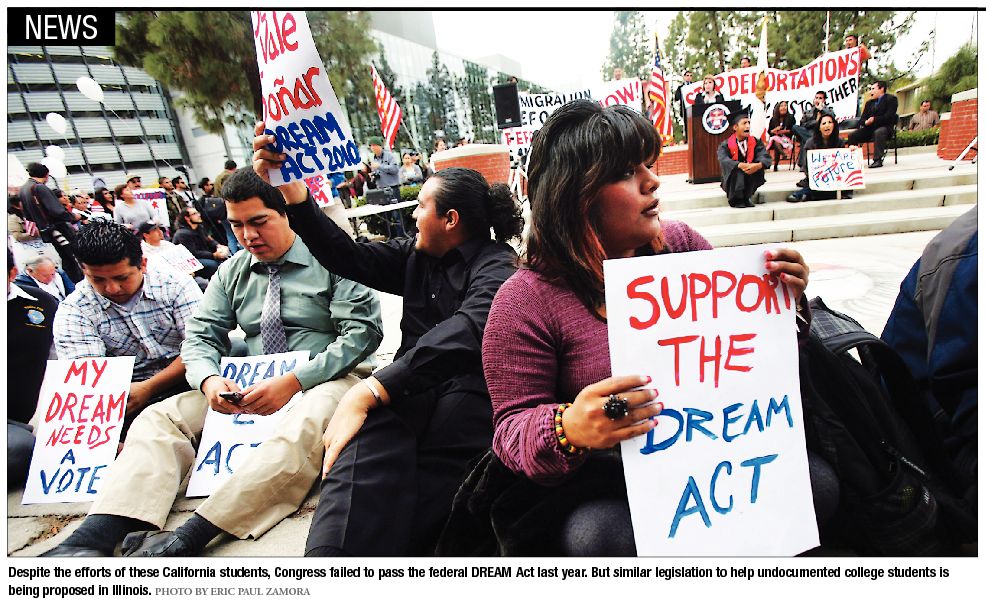
Hundreds rally for Illinois DREAM Act to help undocumented college students
IMMIGRATION | Holly Dillemuth
An undocumented University of Illinois student was among nearly 900 from across the state who convened on the Capitol April 13 to support legislation that would give college students who are undocumented access to identification, a driver’s certificate, better educational counseling in high schools and financial aid.
The DREAM Act failed to pass at the federal level but that hasn’t stopped supporters of the Illinois DREAM Act, the state’s version of the bill, from pushing legislation that would give more rights to undocumented college students who were brought into the United States by their parents. Undocumented youth do not have legal immigration papers like a Social Security card and cannot obtain a legal driver’s license, making it nearly impossible to find a job.
“You have a lot of valuable alumni not being able to get employment after [college],” she says. “I don’t think that it’s right to treat someone less because they’re missing a nine-digit number that was created in the 1930s.”
Currently undocumented students can and do attend universities and colleges across Illinois, which includes 95,000 undocumented “youth.”
But they cannot obtain a driver’s license or insurance for a car, federal loans for higher education or a Social Security card. There is also a fear of deportation among many undocumented students.
The undocumented student, who asked not to be identified by name, says that she has friends at her university who are also undocumented and although she says there is a “safe environment” on campus, it is not the case in the town where she lives.
Ten presidents of universities and colleges, including Michael J. Hogan, president of the University of Illinois, were initial cosigners of a statement supporting the Illinois DREAM Act, as well as 40 different community organizations statewide.
The act would create a privately funded Illinois DREAM Commission, made up of individuals who would raise funds and disperse student scholarships to qualifying undocumented youth. Fred Tsao, policy director for Illinois Coalition for Immigrant and Refugee Rights, a Chicago-based organization, hopes that the commission would be filled with university faculty and community members.
University of Illinois Springfield assistant professor, Hinda Seif, who was present for the advocacy day, said that she would not comment on the bill.
The bill is backed by Senate President John Cullerton and Rep. Edward Acevedo, both Chicago Democrats. Supporters say the act would require no public funding. But this isn’t the first time that the Illinois DREAM Act has been introduced. The act has even passed the Illinois House in years past, but has faced opposition in the Senate.
The undocumented student says the Illinois legislation is especially important because the state has already approved in-state tuition to undocumented students. She says it’s like saying, “‘Yes, you are part of Illinois’ and then, turning around and saying, ‘But that’s about it. We’re not helping you with any other support.’” More than 200 students took a stand and delivered personally signed cards to Cullerton’s office April 13 to remind him of the importance of the bill. An extension has pushed the deadline for House bills to the first week of May.
“We came very close to passing this four years ago,” says Tsao. “We did in fact pass it out of the Illinois House. We just ran into problems in the state Senate.”
“What we want to highlight is that this is very limited legislation,” he says.
The driver’s certificates provision is aimed specifically at young people who are undocumented.
“ [Illinois DREAM Act] allows students to be able to drive to the university, especially if they can attend one that’s in Chicago and don’t have transportation to and from, and it allows more drivers to be insured so we have safer roads and lower costs to our insurance,” says the undocumented student who wishes to remain nameless.
Tsao calls students who qualify for these rights the “best of the best.”
“These are people who came to this country when they were very young with no input from themselves,” says Tsao. “They were brought here by their parents.”
“Certainly in Illinois, we can set a mile for the whole country,” said Illinois Gov. Pat Quinn in an interview at the Statehouse April 13.
“I wish it had passed at the federal level but we’re going to try and pass it here at the state level,” said Quinn, who is hopeful but uncertain if the bill will pass.
Contact Holly Dillemuth at [email protected].